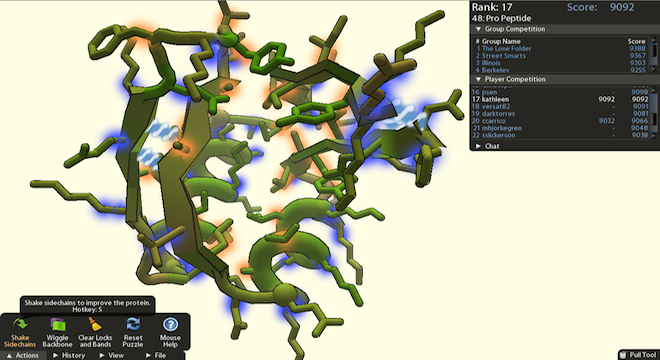Computer game skills could help save lives, and not just virtual ones.
As fanciful as it may sound at first, gamers on Foldit, a crowdsourced, online protein folding simulator from the University of Washington, actually managed to solve a longstanding problem in AIDS research that has vexed scientists for more than a decade. And they did so in about 10 days.
Three players in particular were able to build upon each other to establish the most accurate model to date of an elusive protease enzyme in the AIDS-like Mason-Pfizer monkey virus.
“People have spatial reasoning skills, something computers are not yet good at,” said Seth Cooper, co-creator of Foldit and a researcher at UW Department of Computing Science and Engineering, in a statement. “Games provide a framework for bringing together the strengths of computers and humans.”
The enzyme is responsible for the spread and maturation of the virus, but scientists had so far been unable to identify its exact structure in order to come up with a drug to neutralize it or the corresponding enzyme in human AIDS. Over the past 15 years, scientists had attempted to establish the structure using computerized algorithms to identify the most likely model that would map to the structure of the enzyme, but to no avail. At least until Foldit came along.
The gaming website, launched in 2008, allows anyone with an Internet connection to try their hand at 3D protein folding, that is, modeling the different shape, or structure, that amino acids take to form functional proteins. It currently counts 236,000 players, according to MSNBC’s Cosmic Log.
But because every protein is made up of hundreds, if not thousands of amino acids, there are numerous possibilities on how it can be “folded,” with only one model being the best, or most efficient one that would fit with it. The goal of Foldit is to harness the tenacity and problem-solving creativity of human gamers to determine the best-fitting structure of important proteins.
In this case, researchers held a three-week long competition on the Foldit website to see if they could find the Mason-Pfizer protease structure.
Lo and behold, as researchers from the University of Washington and European institutions put it in a paper on the amazing find published in the journal Nature:
Remarkably, Foldit players were able to generate models of sufficient quality for successful molecular replacement and subsequent structure determination. The refined structure provides new insights for the design of antiretroviral drugs.
Specifically, one Foldit player, codenamed spvincent, took the scientists’ old inaccurate model and improved considerably upon it. Then another player, grabhorn, tweaked it again and made it even more accurate. Finally, Foldit player mimi came up with the final, and most similar model. Cosmic Log’s Alan Boyle corresponded with mimi via email, and she said:
“We were all very excited to hear that we had helped to find the answer to this crystal form, especially since it had been outstanding so long and other methods had been unsuccessful. The feeling of having done something that could make a significant contribution to research in this field is very special and unexpected.
A post on the Foldit website Tuesday applauded the gamers for their historic achievement:
We are so proud of everything that you Foldit players have accomplished already, and we hope that this article will show the world the power of citizen science! This is the first instance we are aware of in which online gamers solved a longstanding scientific problem and we want to thank you all for your amazing work on this and everything else. Speaking of which, we are submitting another paper this week comparing your recipes a gainst the state of the art algorithms.
Indeed, Foldit represents one of the most concrete examples of an emerging discipline known as the gamification of society – the idea that videogaming skills and conventions can be harnessed to solve all sorts of real-world problems in medicine, health, architecture, personal responsibility, employment, traffic dynamics and law enforcement.









